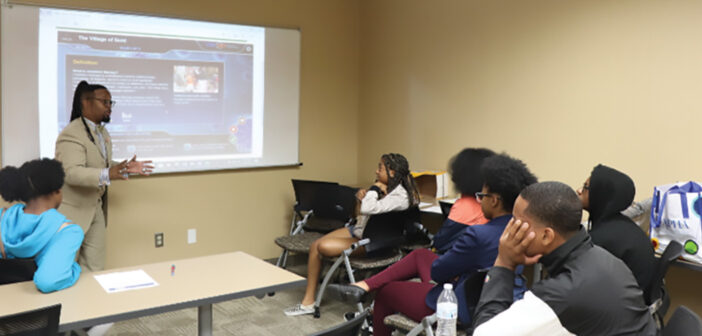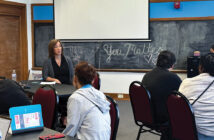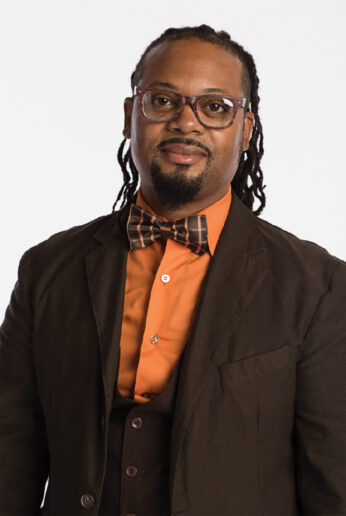
Kent Key, MPH, PhD, Health Disparities Researcher, College of Human Medicine, Michigan State University
In November 2022, Kent Key, MPH, PhD and his academy students stepped off the plane in Boston, MA into a world full of open possibilities. The Flint Public Health Youth Academy (FPHYA) was there on big-time business. They were invited to give a series of presentations at the annual American Public Health Association (APHA) Meeting & Expo – an honor usually reserved for distinguished health professionals and graduate students. The FPHYA members were an anomaly at the convention – something new and different in the realm of public health. The students were young, most still in high school, and they were there to deliver a youth perspective on racism as a public health crisis to public health advocates across the country. They made an instant splash! They were rock stars and the impact of the moment wasn’t lost on Dr. Key. “For many of our students, it was the first time they had ever left Michigan or even the city of Flint,” he relates. “They were new to the situation. I was nervous for them but, as always, they blew me away! It was a great opportunity and what they have accomplished is something that not very many people in the world are able to do at any level.”
The FPHYA’s roundtable and poster presentations proved surprisingly popular at the expo. “I felt kind of bad for some of the other roundtable presenters in the room because many of the attendees were surrounding our table and neglecting the others,” Dr. Key chuckles. “They even set up chairs across from our poster which was only supposed to be a roving exhibition!” FPHYA knocked it out of the park and showcased the great potential of minority youth to contribute to the realm of public health while also acting as an example of the efficacy of the FPHYA program itself.
“The underrepresentation of African American public health professionals may be a contributing factor to the community’s high rates of preventable health disparities.”
Dr. Kent Key
The Flint Public Health Youth Academy exists as a way for Flint youth to be engaged in the process of understanding the role public health plays in communities, its social determinants, and possibilities for change. For many students, it represents a new way of envisioning and thinking about the world. “It really shed a light on the purpose of activism and advocacy,” says FPHYA Youth Ambassador Cruz Duhart. “When I started five years ago, I didn’t understand public health. I came to realize that I had the ability to enact change and to scientifically address the challenges we face. I can do it, too.” A viewpoint of scientist/problem-solver instead of victim encourages participants to consider a future role in the health science and advocacy realms – something Dr. Key envisioned at the start.
FPHYA was created as a possible solution to a major public health problem, namely the racial and ethnic disparities in health outcomes between the African American and European American communities. “African Americans make up 13% of the population but are dying at greater rates and show more negative health outcomes than the majority of the population,” he informs. While researching this phenomenon, Dr. Key found an actionable determinate. “The underrepresentation of African American public health professionals may be a contributing factor to the community’s high rates of preventable health disparities,” he writes. “In addition, studies suggest that minorities are more likely to seek medical and health services from individuals of the same ethnicity.” To test this assertion, FPHYA was formed with the goals to “increase minority representation in the fields of public health, medicine and research”, “to create a pathway to careers in public health for Flint youth”, and “to eliminate health disparities by increasing the number of minority health professionals.”
The FPHYA youth are exposed to the scientific methods used to identify clear barriers to health equity in communities, given the tools to address those barriers grounded in the scientific method, develop relationships with mentors and role models, and gain valuable experience needed for a successful career in public health. Learning sessions in subjects such as Introduction to Public Health, Social Determinants of Health, Health Policy, Research and Research Methods, Environmental Health and others provide a strong foundation for participants to rely on as they form their ideas and methodology. Concepts in advocacy, activism, and policy reform are added to provide the means of obtaining support and community action. Membership in FPHYA includes students aged 12 and up, each with varying levels of engagement. “We have 12 youth interns and eight mentors,” adds Dr. Key. “On our last day of service at the Food Bank of Eastern Michigan, we had 61 participants.” The program has served over 2,000 youth since its inception.
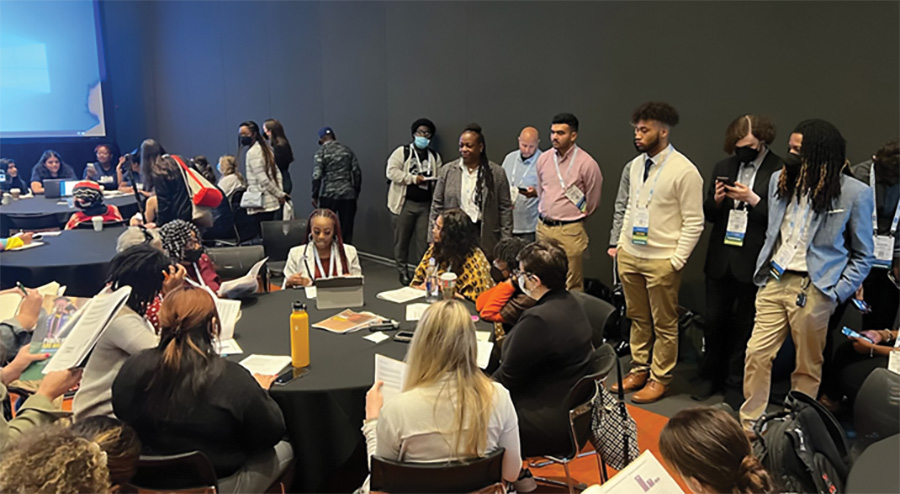
In 2022, the FPHYA was invited to give presentations at the annual American Public Health Association (APHA) Meeting & Expo.
Each summer, the FPHYA holds a two-week camp on the Mott College Campus where new participants are taught the fundamentals. It is open to highly motivated youth between the ages of 12-18 on a first-come, first-served basis. “Our program is different from any other,” Dr. Key explains. “Where most camps take money for attendance, we do the opposite. We pay a stipend to those who participate. They can earn $300 for attending and participating for the duration of the camp.” Another way in which the FPHYA stands out is the fact that it is run by its interns and participants. After camp, Dr. Key and staff act as guides to the process. The youth choose the research subject (such as mental health, gun violence, racism, etc.), facilitate youth community dialogues, and conduct community projects and research. “The subjects we choose to research and dialogue are largely situational,” says ambassador Everett Graham. “What’s going on in the world around us? For example, our recent dialogue on gun violence really hit home for many of us.” In addition to annual youth dialogues and education sessions, the FPHYA also produces a youth-focused, bi-weekly talk show (available on Facebook and YouTube) taking on a variety of public health subject matters. As the program continues to receive accolades, its participants are regarded as professionals in their own right and have even been contracted by outside organizations for their input regarding a variety of public health topics as they pertain to the youth perspective.
Dr. Key established the FPHYA in the hopes that minority youth in Flint would be more apt to join the public health sector as professionals and so far, it has been a success. The students in his program have gone above and beyond his wildest dreams and in doing so, are taking the program with them. The FPHYA is expanding. “A chapter is beginning in Brooklyn, NY,” he says. “We are also getting interest from Wisconsin, Mississippi, North Carolina, Virginia, California and Tennessee. We are working on going national with the FPHYA model.”
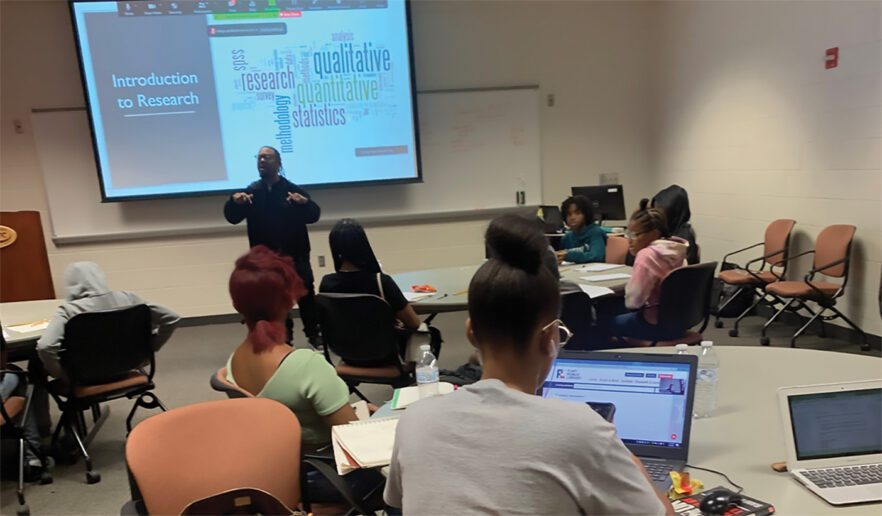
“One big problem in public health is awareness,” adds ambassador Cruz Duhart. “Not everyone is aware of what a healthy community can bring to the table. Many times, those making the decisions are not getting the community members’ perspective of an issue. That results in simply putting a band-aid on the problem instead of fixing the underlying cause. Public health advocacy is about healing the community from the inside out.”
For updates and events, visit the Flint Public Health Youth Academy Facebook page. Search FYPHA810 on YouTube to view current and past Youth Perspective Talk Shows.
To get involved with FPHYA, complete the Youth Academy application at cestudioflint.org/youthacademy. If you would like to provide support, funding to FPHYA or are interested in the program and/or its research, email Dr. Kent Key at keykent@msu.edu.
The FPHYA would like to thank its partners: Flint ReCast, The Community Foundation of Greater Flint, Black Millennials 4 Flint, and the Robert Wood Johnson Foundation.

